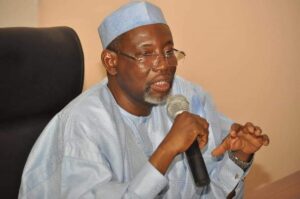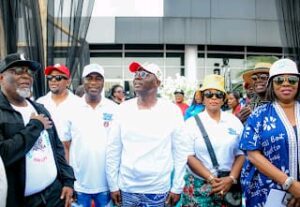High interest rate, non-collateral interventions, others hindering recovery of N4.7trn debt — AMCON
The Asset Management Corporation of Nigeria (AMCON) has blamed high interest rates, non-collateral interventions as some of the factors hindering the recovery of N4.7trillion debt owed to the corporation.
At at an interactive session with the Management of AMCON led by its Managing Director/Chief Executive Officer, Mr Ahmed Lawan Kuru OFR at the New Senate Building, National Assembly Complex, Abuja yesterday, he said that the Corporation had to inject a total sum of N2.2 trillion to ten (10) Banks – Bridged and Owned Banks (intervened banks) – bringing Net Book Value (NAV) to Zero.
This N2.2trillion was not backed by any collateral, which made recovery extremely difficult. AMCON, he said, capitalised three EFIs and provided financial accommodation to five others.
The Corporation he stated took over Skye Bank (now Polaris) under the bridged back concept of the CBN and NDIC. The Bank had stabilized, and since transferred to its new owners by the CBN. The Corporation is battling with some of the oil and gas facilities acquired from the bank.
“AMCON purchased 12,743 NPLs or EBAs worth N3.797 trillion from 22 Eligible Financial Institutions (EFIs) for a purchase price of N1.8 trillion. The purchases are covered by various collateral,” he said.
According to Kuru, AMCON’s intervention activity was funded by a debt obligation of N4.65 trillion (as at 31st December 2018), which is to be repaid, from internal and external sources, to the CBN by 2024. It is worth knowing that, at conception, it was envisaged that AMCON being a loss minimisation entity would repay 30 percent of the obligation. The balance of the AMCON debt was to be offset by the Banking Sector Resolution Cost Fund (“BSRCF”).
According to a release by Jude Nwauzor, the spokesperson of the Corporation, the Chairman Senate Committee on Banking, Insurance and other Financial Institutions, Senator Adetokunbo Abiru vowed that the 10th Senate of the Federal Republic of Nigeria would ensure that the best objectives of setting up the Asset Management Corporation of Nigeria (AMCON) by the Federal Government in 2010 are achieved.
Abiru who frowned at the huge interest rates that AMCON pays to the Central Bank of Nigeria (CBN) said if that is allowed to continue would practically make it impossible for the much-touted AMCON sunset to be realised. He said a situation where AMCON pays as much as six per cent to the CBN and also charged some percentage on obligors whose businesses were already challenged before AMCON intervention was not a healthy practice as AMCON’s current exposure stands at about N4.7trillion.
He therefore said his committee will engage the CBN, and all relevant stakeholders to take a second look at the AMCON funding model, the interest elements and all other processes that would hasten the resolution of the huge burden that AMCON presently carries.
Summarising the essence of the interaction to the media at the end of the in depth discussion, Abiru said the 34-member committee was happy that AMCON is up to date with its budget and records and remains one of those government institutions that the committee did not have to chase up and down before they submitted their records for review. While praising the leadership of AMCON and calling on the Management to sustain such ethical practice, he said the committee was happy that AMCON has submitted its audited accounts up to the financial year 2022.
According to him, members of the committee were satisfied that even before the convening of the interactive session, which is the first the committee was holding since the inauguration of the Committee on Banking, Insurance and other Financial Institutions by the Senate, AMCON had forwarded to his office a copy of their performance as of September 2023, which he said was very impressive record by a government agency.
He added, “I will also believe that the role of AMCON is further underscored by the fact that it was set up using a model that would help us tidy up the challenges that we had in the financial system dating back to the global financial crisis of 2008/2009. That gave rise to the institution and equally the model that also well suited for the agency in terms of the Eligible Bank Assets (EBAs) that they acquired.”
“The only challenge that we have today remains the sunset date, which is to say we should as a government have a definitive time to make sure that we wind down – meaning that all the obligations that are hanging in the books of AMCON must be redeemed. The conclusion is that we (the 10th Senate) will continue to work with AMCON and the apex regulatory agencies to make sure that AMCON is wound down within the shortest possible time.”
Abiru who is representing the Lagos East Senatorial District at the 10th Nigerian National Assembly was a former Group Managing Director/Chief Executive Officer of Polaris Bank Limited, Nigeria. The bank was formerly Skye Bank Plc before AMCON intervention through the directive of federal financial regulators such as the Central Bank of Nigeria (CBN), the Nigeria Deposit Insurance Corporation (NDIC) amongst others.
Earlier in his submission to the committee, Kuru who was accompanied to the Senate by the Executive Director in charge of Asset Management, Dr Eberechukeu Uneze among other senior officials of the agency reminded Abiru and his committee that some of the assumptions underpinning the funding model were: i. The banking sector was projected to grow at 20 percent per annum
- Each bank would contribute 0.5 percent (initially 0.3 percent) of total assets per year to the BSRCF. CBN to contribute N50 billion per year to the BSRCF.
The reality is that, the above-mentioned assumptions did not materialise, for instance:
- The actual growth rate of banking sector total assets from 2013 to 2017, with 2013 being the commencement year of contribution, has been approximately 8.4 percent (as against the target of 20 percent), and not all DMBs have contributed to the BSRCF. In monetary terms, the actual Sinking Fund contribution from 2013 to 2017 was N1.13 trillion as against an expected N1.45 trillion. This is a shortfall of N0.32 trillion.
- The actual recovery on recapitalized banks and intervened banks was 23% and 10 percent, respectively.
iii. AMCON bonds were refinanced by the CBN at 6 percent and this is higher than the rate payable by other intervention funds.
- The cash shortfall from internal and external sources meant that there were less funds to invest at the stated reinvestment rate.
The expected variance between forecast and estimate for 2018 to 2024, assuming a compound annual growth rate (CAGR) of 8.4 percent, is N1.56 trillion. The total shortfall gap in the Sinking Fund is N1.7 trillion. Bear in mind that the Sinking Fund was meant to contribute 70 percent of the funds required to settle AMCON’s obligations.
In conclusion, Kuru informed the Senators that to enable AMCON succeed in its national call to duty, AMCON solicits the support of this esteemed Senate Committee Members in the following areas: the engagement with the Judiciary, and engagement with other stakeholders like CBN, the federal Ministry of Finance etc, particularly with reference to the exit plan.




